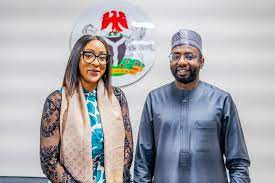Key stakeholders in Nigeria’s technology and financial sectors have emphasized the need for stronger compliance frameworks to support the country’s growing blockchain ecosystem. Speaking at the inaugural Blockchain Compliance – Level 1 Training in Lagos, top regulators and industry experts stressed the importance of collaboration, policy development, and ethical practices to position Nigeria as a leader in blockchain innovation.
The Director-General of the National Information Technology Development Agency (NITDA), Kashifu Inuwa Abdulahi, highlighted the agency’s efforts to establish Nigeria as a global leader in blockchain compliance. Through policy development and partnerships with academia, tech hubs, and regulators, NITDA aims to foster a well-regulated and innovative blockchain environment.
Similarly, the Director-General of the Securities and Exchange Commission (SEC), Emomotimi Agama, revealed that the SEC has taken proactive steps to regulate blockchain-based financial services. He noted that through the Accelerated Regulatory Incubation Program (ARIP) and the Regulatory Incubation (RI) framework, the SEC has granted approvals in principle to select blockchain firms, ensuring that regulatory oversight keeps pace with industry growth.
Agama further emphasized that compliance must go beyond basic regulatory requirements to maintain industry integrity. As blockchain adoption increases, effective regulation will play a crucial role in ensuring security, trust, and long-term sustainability.
Jude Ozinegbe, founder of Cyberchain and Lead Facilitator of the training, stressed that blockchain compliance is now a necessity rather than an option. “Blockchain compliance is no longer optional; it is the foundation for a sustainable and trustworthy industry. As the blockchain ecosystem grows, so do the risks of misuse and regulatory challenges. This training is a call to action for operators, regulators, and practitioners to collaborate, bridge the gap between innovation and regulation, and embed a culture of ethical practices,” he stated.
Ozinegbe also emphasized the importance of equipping professionals with practical compliance skills to create a safer, more transparent, and globally competitive blockchain industry in Nigeria.
One of the participants, Simeon Nofa, CEO of Pengage Finance, reflected on the evolution of blockchain regulation in Nigeria. “When I entered the blockchain industry in 2017, the idea of regulations and blockchain coexisting seemed almost impossible. Many players resisted regulation, believing it conflicted with the decentralization ethos driving cryptocurrency. However, the industry’s shift towards sustainability has shown that an appropriate regulatory framework fosters safety and trust. This training is a significant milestone for Nigeria’s virtual asset ecosystem,” he remarked.
With increased interest in blockchain applications, Nigeria’s regulatory bodies and industry leaders are working toward creating an enabling environment that balances innovation with compliance. As blockchain technology continues to evolve, structured regulatory measures will be essential in ensuring security, trust, and long-term growth for businesses and consumers alike.










